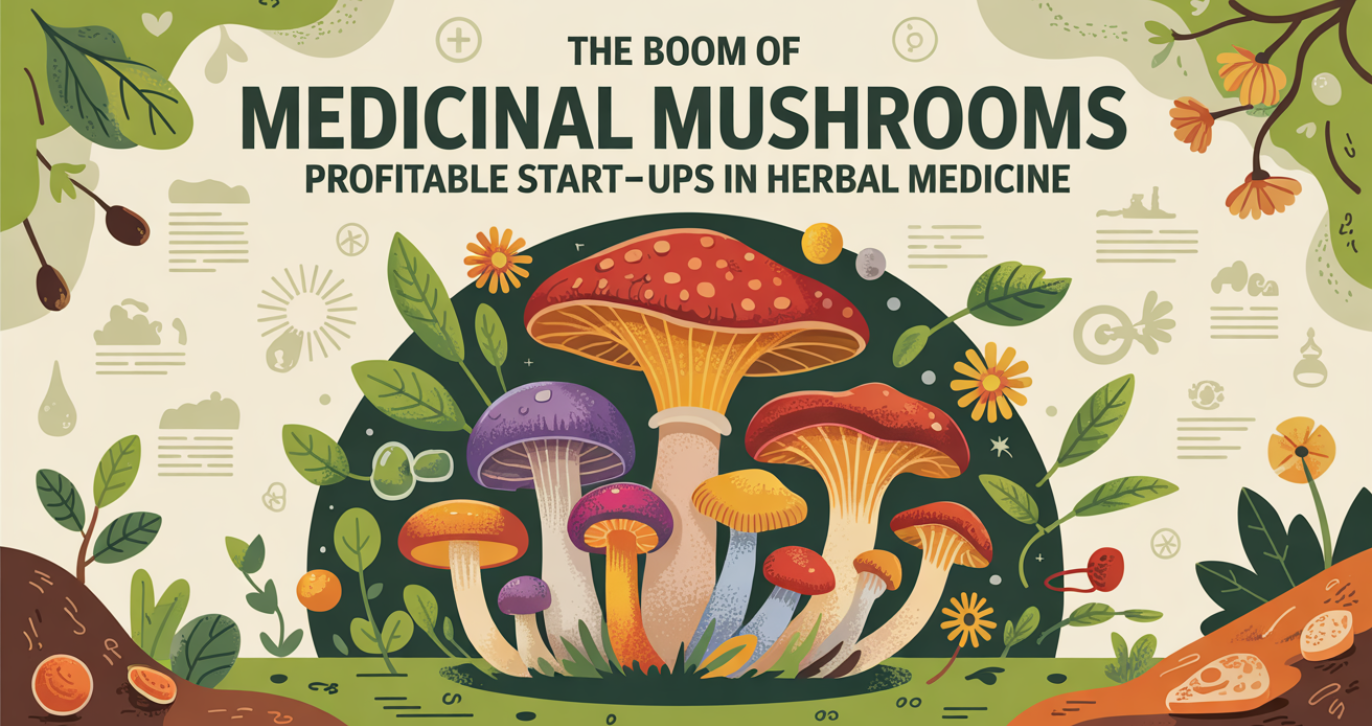Medicinal mushrooms have a history of use in traditional medicine around the world, and in recent times have increasingly found applications in modern wellness and pharmaceutical approaches. These mushrooms do have different health benefits, such as boosting immunity and cognitive enhancement. Overall, these fungi have broadened the future of herbal medicine. This article covers the emerging medicinal mushroom start-ups, the reasons for their successful thriving, and the investments that would be profitable in this sector.
The Growing Demand for Medicinal Mushrooms
A holistic and natural healthcare market has fostered medicinal mushrooms, with consumers at the center becoming aware of different mushrooms such as Reishi, Lion’s Mane, Chaga, Cordyceps, and Turkey Tail and how they equate to the overall health of a person. The world today is coming forth where stress, forbidding diets, and every environmental toxin are a bitter reality in human life. Thus, medicinal mushrooms produce a drastic difference from synthetic drugs and therefore piques interest. Also, social media and wellness influencers were brought into the public eye via the popular mainstream market.
Many studies on human subjects invariably end with the therapeutic validation of the miracle mushrooms. Lion’s Mane has thus been a research subject, and it promises potential benefits in terms of nerve regeneration and symptoms associated with neurodegeneration, such as Alzheimer’s and Parkinson’s. It has made Cordyceps start being talked about as it found eligibility in oxygen utilization within the body and better athletic performance, which is quite interesting for health buffs and serious athletes.
Profitability of Medicinal Mushroom Start-ups
The medicinal mushroom business has come a long way, running into billions, and valuation is set to soar by the year 2030 to that projection of $20 billion. It presents numerous factors that make a startup in this business very profitable:
- Cost-effective cultivation: Mushroom farming is cheaper in terms of resources and land compared to pharmaceutical cultivation. The vertical method of mushroom farming allows for maximum utilization of space for high yields per business.
- Wide usage of products: Medicinal mushrooms products come in the form of powders, capsules, extracts, teas, and even into the beauty industry.
- Great demand from consumers: The more aware they are, the more they are spending money. Subscription-based models, as well as customized wellness packages, are gaining ground for a lot more steady revenues for startups.
- E-commerce opportunities: The rise of online wellness markets enables startups to address global customers with ease. Amazon, Shopify, and around selling health-conscious consumers through dedicated wellness sites, make it much easier for entrepreneurs to reach customers directly.
Some of the Successful Startups in the Industry
Numerous start-ups have launched into the medicinal mushroom industry and done quite well for themselves. A few of them include:
Four Sigmatic: A highly reputable name associated with mushroom-based coffees, teas, and elixirs. Most of the health-conscious consumers flock to this flavour, which has also extended itself into international markets.
Host Defence: Established by well-known mycologist Paul Stamets, this concept emphasizes high-quality mushroom supplements that enhance immune and cognitive health. Their promise for sustainability and strict quality control has helped them build a point of differentiation within the industry.
Om Mushrooms: They provide a range of organic mushroom powders and supplements for wellness and fitness communities. They have established significant partnerships with retail markets and online stores for making these products readily available.
Real Mushrooms: Family-owned business offering pure, organic mushroom extracts without fillers or artificial ingredients. The transparency has earned them a lot of loyal customers in sourcing and processing.
Also read: Growing Manufacturing Industry of Herbal Toothpaste
Major Obstacles in the Medicinal Mushroom Market
The industry offers potential, but there are hurdles through which the start-ups must pass:
Regulatory hurdles: Several countries restrict how herbal supplement products may be marketed and what health claims may be made. Start-ups have to keep themselves free from any legal issues by complying with FDA, EU, and whatever other international regulatory bodies.
Quality control: From purity to potency, mushroom-based products must be tested and sourced under rigorous norms. Heavy metals or pesticides may be other harmful contaminants that may make the mushroom products unsafe or ineffective.
Market competition: The more companies that enter the market, the more important differentiation becomes. Unique formulations or extraction methods and innovative delivery formats (gummies, liquid extracts) are ways to differentiate the brand.
Consumer skepticism: Medicinal mushrooms are becoming more popular; however, some consumers are still unsure about their efficacy. Information the consumers can trust, like supply chain transparency and scientific backing, will be their remedy.
Steps to Starting Up a Medicinal Mushroom Business
If you are new to the medicinal mushroom market, the following steps are key:
Market Research: The prerequisite purchase and consumption of mushroom products need to be identified, and the subsequent market customer profile identified.
Sourcing & Cultivation: Grow your mushrooms or partner with a trusted supplier.
Product Development: Decide in which form your product will be available (capsules, powders, extracts, beverages, etc.).
Regulatory Compliance: Make sure your nasty injection does not break any EC regulations.
Branding & Marketing: Establish a distinguished brand identity and take advantage of digital marketing methods to effectively reach the target audience.
Distribution Channels: Sell online and through health and retail drug stores.
Innovation: Stay updated on trends and science that keep getting out to continuously add to the product range.
With a professional identity, good-quality packaging, and influencer engagements, a good start for a mushroom start-up could gain immense visibility and credibility. Simultaneously, developing educational content around the product via blogs, webinars, and social media will greatly serve to inform potential customers, thus instilling brand loyalty.
Also read: Packaging Made of Mushrooms: An Eco-Friendly Substitute for Plastic
Future Directions Associated with the Medicinal Mushroom Industry
Research is still ongoing, and here are a few trends that are helping to better position the sector for the new age:
Functional Foods & Beverages: The mushroom-charged coffee, chocolate, and protein bar trend holds promise.
Custom Medication: Merging mushroom blends according to genetic and health profiles is something that companies are pursuing.
Closing Thoughts
The mushrooming medicine market is gaining strength and opening vast avenues for entrepreneurs wanting to enter the herbal medicine market. The global demand, support with modern technologies, and legitimacy through modern descriptions of medicines are proving lucrative and viable for the medicinal mushroom market. Small companies investing in quality, innovation, and marketing will find a successful niche in this thriving industry. Businesses can strengthen themselves as leaders within the natural health movement by complying with regulations and providing full transparency and education around their products.









